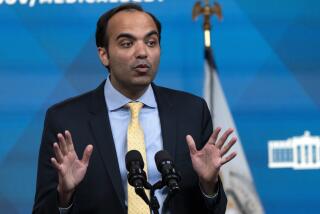FCC Restricts Small Long-Distance Firms
- Share via
The Federal Communications Commission this week moved to halt potential gouging of customers using pay phones for long-distance calls.
The agency’s action addresses a problem that travelers have come to know all too well. Stuck in an airport or hotel, travelers reach for the nearest phone and start talking. A month later, the phone bill arrives--often accompanied by sticker shock.
Why? The calls consumers thought they had placed over one of the nation’s Big Three long-distance carriers--and even charged to their accounts with one of those carriers--had actually been handled by one of the nation’s approximately 200 small private long-distance operators under contract with the hotel or airport. And that private operator, whose name may still be unknown to the customer, charged fees that were as much as three times higher than those levied by the major carriers.
After receiving thousands of consumer complaints about that and similar situations during the past several years, the FCC acted Tuesday to impose restrictions on the private telephone service providers.
Effective immediately, operator service companies must identify themselves to callers at the beginning of each toll call and provide, upon demand, a detailing of their fees. The operators are also prohibited from blocking callers from using the long-distance carrier of their choice.
“We want to make sure that customers are reaching the long-distance carrier they want to use,” said Sally Novak, an attorney in the FCC’s common carrier bureau. “We’re also concerned about abusive charges from some of the long-distance service providers.”
The exact magnitude of the problem has never been measured, and Novak said the FCC had not determined how much its new rulings could save consumers. However, she said consumers are bound to benefit when given enough information to select a less costly carrier.
American Telephone & Telegraph, the nation’s largest long-distance firm that is also reportedly most affected by the alternative carriers, said it received more than 10,000 complaints last year from callers forced to use private operators.
AT&T; has recently started a hard-hitting television advertising campaign to alert consumers to the possibility that pay phones may not give them access to the carrier of their choice.
The latest FCC action is the result of a requirement in last year’s federal Telephone Operator Consumer Services Act that ordered the commission to ensure that callers using hotel and pay telephones would have access to the long-distance companies of their choice.
More to Read
Inside the business of entertainment
The Wide Shot brings you news, analysis and insights on everything from streaming wars to production — and what it all means for the future.
You may occasionally receive promotional content from the Los Angeles Times.










